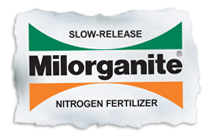Milorganite: The Essence of Earth Day
April 4, 2016It's fitting that Wisconsin, the origin of Earth Day, is home to the world’s longest-running and nation’s largest recycling program: Milorganite.
Earth Day, which began in 1970 at the prompting of then Wisconsin U.S. Senator Gaylord Nelson, evokes images of volunteers clearing debris from shorelines, elementary school students planting trees, and communities collecting hazardous materials from homeowners to protect land and water. Earth Day was the birth of the modern environmental movement.

But how does Milorganite—a fertilizer—fit into Earth Day’s focus on environmental stewardship?
“I’m sure most people don’t think of fertilizer and environmental stewardship as being related. Actually, most would say they’re at odds with each other,” said Milorganite Director of Marketing, Jeff Spence. “But when you’re talking about Milorganite, they’re definitely related.”
Spence is referring to the Milwaukee Metropolitan Sewerage District’s (MMSD) production of Milorganite, a slow-release nitrogen fertilizer. Nutrients are reclaimed from wastewater using large-scale processes that mimic nature. Through research conducted in the early 1900s, it was found that the resulting product was useful as a fertilizer and safe to use on lawns and gardens. “It’s a form of recycling we normally wouldn’t think about,” added Spence.
“In 2016, Milorganite celebrated its 90th anniversary of commercial production,” said Spence. “We’re proud to have been stewards of the environment long before it was even a concept. Here we’ve been doing it for over nine decades.” And in those 90 years nearly 9.8 billion—that’s with a “B”—pounds of nutrient-rich material has been diverted from landfill to re-use.
“In recognizing Earth Day and participating in activities that promote a cleaner environment, we should also remember how bad things were more than 100 years ago. In the early 1900s, Milwaukee’s waterways were essentially open sewers. There was even talk of building a plank road over the Milwaukee River to simply hide the problem,” explained Spence. Another solution was to literally flush the river into the lake periodically, pushing the problem farther downstream, but not really addressing it.
“We encourage everyone to do their part in protecting the environment. It’s something we need to consider every day, not just on Earth Day. Stewardship is a habit. Little things like recycling as much paper, cans and bottles as possible make a difference. Or in the case of Milorganite production, using more renewable energy on a major scale and reducing waste,” concluded Spence. “And, yes, using products to maintain your lawn that doesn’t harm the environment, like Milorganite, is another habit homeowners can feel good about.”
About Milorganite: Celebrating over 90 years of production, is one of the world’s largest and nation’s oldest running recycling programs. Headquartered in Milwaukee, Wisconsin, Milorganite products are manufactured and marketed by the Milwaukee Metropolitan Sewerage District (MMSD), a regional government agency that provides water reclamation and flood management services for about 1.1 million customers in 28 communities in the Greater Milwaukee Area. Since 1926 Milorganite has been a world leader in supplying slow-release nitrogen fertilizer for professional and residential use. While revenue generated through the sale of Milorganite products does not make up for the entire cost to produce and market, our belief in beneficial reuse and recycling makes producing our value-added products the clear choice.

